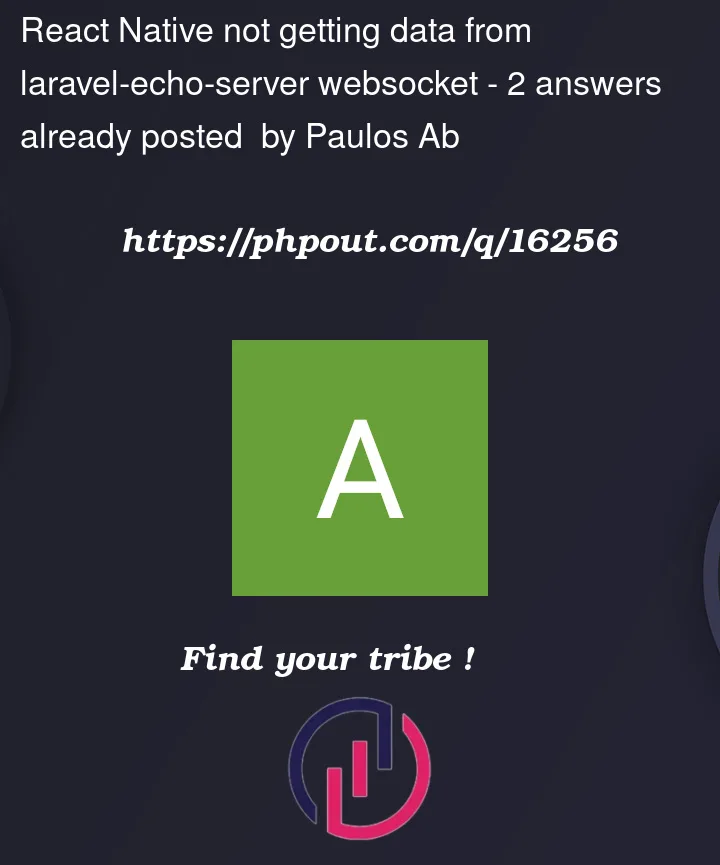Note: I have been on this issue for a week now and I have tried different solutions online including StackOverflow but none works
I have an app that I built in React Native Expo and I am adding a chat feature to the app, I built the app’s API with Laravel.
I am now setting up websocket for the chat, I installed Laravel Echo and socket.io on the React Native app (client side) and on the backend (Laravel end) I am using laravel-echo-server and laravel broadcasting
I have set up the websocket and redis, because I am using redis as the broadcasting driver
everything works well on the backend, if an event was dispatched I can see on the laravel queue:work terminal and the laravel-echo-server also prints message Event: message.created
Channel: chats1
these are my backend code
Redis configuration in .env file
BROADCAST_DRIVER=redis
QUEUE_CONNECTION=redis
REDIS_HOST=127.0.0.1
REDIS_PASSWORD=null
REDIS_PORT=port_number
REDIS_CLIENT=predis
the event class
<?php
namespace AppEvents;
use AppModelsUser;
use IlluminateBroadcastingChannel;
use IlluminateBroadcastingInteractsWithSockets;
use IlluminateBroadcastingPresenceChannel;
use IlluminateBroadcastingPrivateChannel;
use IlluminateContractsBroadcastingShouldBroadcast;
use IlluminateFoundationEventsDispatchable;
use IlluminateQueueSerializesModels;
use AppModelsMessage;
class UserChatEvent implements ShouldBroadcast
{
use Dispatchable, InteractsWithSockets, SerializesModels;
/**
* The order instance.
*
* @var AppMessage
*/
public $message;
/**
* Create a new event instance.
*
* @return void
*/
public function __construct(Message $message)
{
$this->message = $message;
}
public function broadcastAs()
{
return 'message.created';
}
/**
* Get the channels the event should broadcast on.
*
* @return IlluminateBroadcastingChannel|array
*/
public function broadcastOn()
{
return new Channel("chats1");
}
}
laravel-echo-server.json
{
"authHost": "https://my_domain.com",
"authEndpoint": "/broadcasting/auth",
"clients": [],
"database": "redis",
"databaseConfig": {
"redis": {
},
"sqlite": {
"databasePath": "/database/laravel-echo-server.sqlite"
}
},
"devMode": true,
"host": null,
"port": "6001",
"protocol": "http",
"socketio": {},
"secureOptions": secret_number,
"sslCertPath": "",
"sslKeyPath": "",
"sslCertChainPath": "",
"sslPassphrase": "",
"subscribers": {
"http": true,
"redis": true
},
"apiOriginAllow": {
"allowCors": true,
"allowOrigin": "*",
"allowMethods": "*",
"allowHeaders": "*"
}
}
database.php redis configuration
'redis' => [
'client' => env('REDIS_CLIENT', 'phpredis'),
'options' => [
'cluster' => env('REDIS_CLUSTER', 'redis'),
'prefix' => env('REDIS_PREFIX', Str::slug(env('APP_NAME', 'laravel'), '_').'_database_'),
],
'default' => [
'url' => env('REDIS_URL'),
'host' => env('REDIS_HOST', '127.0.0.1'),
'username' => env('REDIS_USERNAME'),
'password' => env('REDIS_PASSWORD'),
'port' => env('REDIS_PORT', '6379'),
'database' => env('REDIS_DB', '0'),
],
'cache' => [
'url' => env('REDIS_URL'),
'host' => env('REDIS_HOST', '127.0.0.1'),
'username' => env('REDIS_USERNAME'),
'password' => env('REDIS_PASSWORD'),
'port' => env('REDIS_PORT', 'port'),
'database' => env('REDIS_CACHE_DB', '1'),
],
],
React Native End
import Echo from 'laravel-echo';
import socketio from 'socket.io-client';
...
const echo = new Echo({
host: 'ws://my_domain.com:6001',
broadcaster: 'socket.io',
client: socketio,
});
echo
.channel('chats1')
.listen('.message.created', (ev: any) => {
Alert.alert('Socket Msg', 'Got data success')
console.log('socket msg:', JSON.stringify(ev))
}).error((er: any) => {
Alert.alert('Socket Err', 'An error occured')
console.log('socket error msg:', JSON.stringify(er))
});
Nothing is being logged in the console as response from laravel-echo-server, what I’m I doing wrong? or what didn’t I do correctly, please I have been on this issue for a week now




2
Answers
I have finally found a solution to it, the issue was caused by socket.io new releases, I have to downgrade the socket.io to
2.4.0from4.x.xI found the solution here Laravel Echo Server, Redis, Socket.IO: Can't seem to make them work
You have a typo. This part of the code should be:
Remove the dot before message.created and try again.